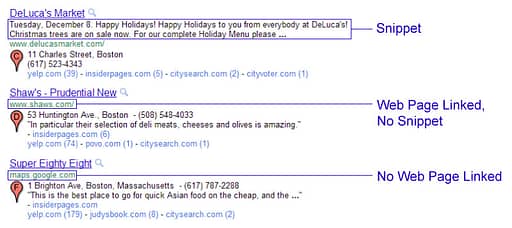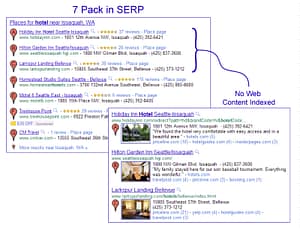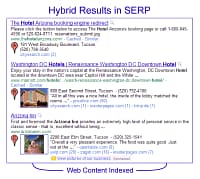Google’s search engine results page (SERP) has undergone dramatic change over the last few months. The most significant change (especially for those interested in local search engine optimization) is the integration of Place results with organic results on the SERP (i.e., Hybrid Results).
Local Splash has been closely evaluating how the Hybrid Results affect ranking, impressions and click through rate. To determine if any changes to optimization strategy should be implemented, we must understand what factors dictate whether Google displays the 7-Pack or the new Hybrid Results on the SERP.
7-Pack vs Hybrid Results
An in-depth study of various queries across 20 cities was conducted by Local Splash. The primary factor used by Google to determine which format local results are displayed is the Web Content directly associated with the local results: 7-Pack or Hybrid. Web content is a brief snippet between the title of the Place and the URL. In nearly all cases, Hybrid Results are displayed if the top three Place listings contain a Web Content snippet.
Snippet vs No Snippet
This snippet is only displayed when the page is natural HTML, does not redirect to another pager, and is considered unique content by Google. The web page associated with the local result can be managed by the verified owner of a Place Page. For Place Pages that are not owner verified, Google will make efforts to include a Web page and snippet that is directly associated with the Place listing (e.g., the location page of the businesses web site).
 |
We continue to investigate how Web Content affects local business ranking, and will publish our findings in an upcoming post.
UPDATE January, 2011:
After careful sampling in comparing implicit and explicit local search querier, we’ve found that the hybrid algorithm closely resembled that of traditional web organic results in a few ways:
- Businesses with multiple locations in a single city are limited to a single search result.
- As with web search, the results are webpages and a map letter is assigned if a Place page can be associated to it. The association occurs when a Place’s website is matched to the root domain of the webpage URL.
- The ranking of the hybrid webpages was found to nearly match that of a traditional Google web search. Since Google serves local results for nearly all local queries, we had to compare this by running queries from computers outside the United States and on queries that wouldn’t commingle Places page results.
The implications of this mean that larger, well established websites with local properties have a disproportionate advantage in local search. In fact, we’ve observed some cases where very poorly ranking Maps results shot up to the top page of a hybrid result simple because their website was well optimized.
It’s a sad day for local business owners that haven’t invested in a decent website.



